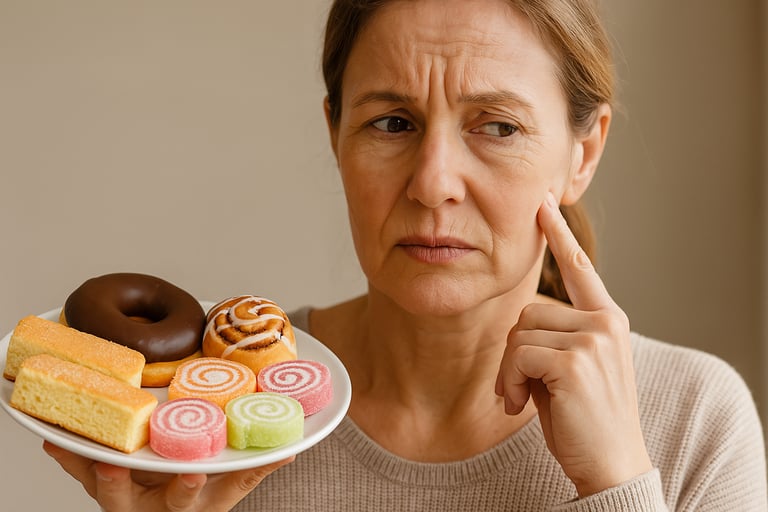Sugar and Skin Aging: How Your Sweet Tooth May Be Making You Look Older
Excess sugar can accelerate skin aging by damaging collagen and elastin. Learn how sugar and skin aging are linked and what you can do to protect your skin.
Dr Priya Gill
8/16/20253 min read
Sugar and Skin Aging
Most people know that too much sugar is bad for their waistline and overall health—but far fewer realise it may also be visibly aging their skin. The connection between sugar and skin aging has become an important area of interest in both dermatology and nutrition, and for good reason: research shows that high sugar intake can speed up skin aging by damaging essential proteins like collagen and elastin.
The good news? With the right diet and skincare habits, it’s possible to slow down this process and keep your skin looking firm, smooth and youthful for longer.
What Is the Link Between Sugar and Skin Aging?
To understand how sugar and skin aging are related, it helps to look at what happens in the body after consuming sweets and refined carbohydrates.
When sugar enters the bloodstream, it can attach itself to proteins such as collagen. This process is called glycation, and it leads to the production of molecules known as Advanced Glycation End-products (AGEs). These AGEs accumulate in the skin over time and directly damage collagen and elastin—the two main proteins that keep skin firm, stretchy and youthful.
In other words:
More sugar → more AGEs → faster breakdown of collagen → more wrinkles, sagging and dullness.
It’s important to note that this doesn’t only apply to obvious sugary treats like cakes and candy. Refined starches such as white bread, pastries, sweet drinks (including bubble tea) and even packaged breakfast cereals all break down quickly into sugar in the body and contribute to glycation.
Why Glycation Matters for Skin Health
Collagen and elastin fibres give the skin structure, elasticity and strength. When these fibres become stiff, brittle or fragmented as a result of glycation, the skin loses its ability to bounce back and starts to appear thinner and more wrinkled.
The impact of sugar and skin aging becomes more visible with age, especially in people with a high-sugar diet. In addition to wrinkles and sagging, glycation can also lead to:
Dull skin tone
Yellowish discolouration
Rough texture
Slower wound healing
While the body naturally produces some AGEs as part of normal metabolism, high daily sugar intake significantly accelerates their formation.
Practical Tips to Reduce Glycation and Protect Your Skin
The good news is that the effects of sugar and skin aging can be slowed down by making a few lifestyle and diet changes. These practical strategies are easy to implement and can make a noticeable difference over time.
1️⃣ Cut Back on Added Sugars
Limit foods and drinks with added sugars such as:
Soft drinks, sweetened teas and bubble tea
Pastries, cakes and cookies
Packaged breakfast cereals
Flavoured yogurts and bottled juices
Tip: Read food labels and look out for ingredients such as sucrose, glucose syrup and maltose.
2️⃣ Choose Low-Glycaemic Carbohydrates
Opt for whole grains and complex carbohydrates that don’t spike blood sugar quickly:
✅ Brown rice
✅ Oats
✅ Whole-grain bread
✅ Legumes and beans
These help keep blood sugar stable and reduce the speed at which glycation occurs.
3️⃣ Eat More Antioxidant-Rich Foods
Antioxidants help neutralise AGEs and protect skin cells from oxidative stress. Add these foods to your diet regularly:
Berries (blueberries, strawberries, raspberries)
Leafy greens (spinach, kale)
Nuts and seeds (almonds, walnuts, sunflower seeds)
Turmeric and green tea
4️⃣ Support Collagen with Smart Skincare
Combining a healthy diet with a well-planned skincare routine boosts skin repair and slows visible aging. Look for products containing:
Vitamin C (supports collagen production)
Retinoids (stimulate cell renewal)
Peptides (help rebuild skin structure)
And of course, never skip sunscreen—UV exposure creates free radicals that accelerate glycation even further.
Summary: Sugar and Skin Aging in a Nutshell
The link between sugar and skin aging is clear: the more refined sugar and high-glycaemic foods consumed, the faster collagen is damaged. Fortunately, reducing sugar intake, eating antioxidant-rich foods, and using collagen-supporting skincare products can significantly slow down the aging process.






Need Help Personalising Your Diet or Skincare?
Don’t let misinformation guide your skincare. Consult the experts at Ranjit Skin & Hair Specialist Clinic and get a personalised acne treatment plan that works.
Book your consultation today. Your skin deserves the truth—and expert care.
Whatsapp at +60 12-279 4980 to make an appointment!




Expert dermatology and hair care solutions await.
Address
C4, Jalan SS15/4D, Subang Jaya, 47500 Petaling Jaya, Selangor
© 2025. All rights reserved.


Contacts
Clinic: +60356316090
Whatsapp: +60122794980
Email: klinikranjit16@gmail.com
